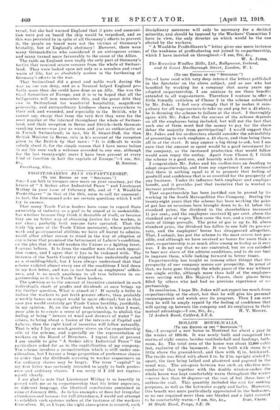[To THE EDITOR. OF THE " SPECTIVOR."1
Sus,—I have read with very deep interest the letters published in the Spectator on the above subject, and as one who has benefited by working for a company that many years ago adopted co-partnership, I am anxious to see those benefits extended to all wage-earners. Therefore I venture to offer a little friendly criticism of Clause 2 in the scheme submitted by Mr. Jukes. 1 feel very strongly that if he makes it com- pulsory for all wage-earners to take up and pay for a XI share, he is dooming the scheme to failure at the start. I thoroughly- agree with Mr. Jukes that the success of the scheme depends on all the employees being included, but will not the fact that each one of them must find the money to pay for the share debar the majority from participating? I would suggest that Mr. Jukes and his co-directors should consider the advisability of presenting to each employee a £1 share, and thus bring them all in at the start. It may appear a big thing to ask, but I am sure that the amount so spent would be a good investment for the company, as the increased production that would follow
would soon repay the outlay. Apart from Clause I think the scheme is a good one, and heartily wish it success.
I congratulate Mr. Jukes and his co-directors on deciding to adopt co-partnership, and from my experience I am convinced that there is nothing equal to it to promote Unit feeling of goodwill and confidence that is so essential for the prosperity of any business. Under its influence both employer and employee benefit, and it provides just that incentive that is wanted to increase production.
That co-partnership has been justified can be proved by its working in the South Metropolitan Gas Company. During the twenty-eight years that the scheme has been working the price of gas has on occasions been brought down to 1.s. 141. below the standard price; the dividend to the shareholders increased 1} per cent., and the employees received 91 per cent. above the standard rate of wages. Then came the war, and a very different state of things prevails. The price of gas is up ls. 3d. above standard price, the dividend has fallen to one half its pre-war rate, and the employees' bonus has disappeared altogether. That, I submit, has put the scheme to the most severe test pos- sible, and although we have received no bonus for more than us year, co-partnership is as much alive among us to-day as it ever was. I do not say that we arc contented, but we are satisfied to bear our share of the adverse conditions, and to do our best to improve them, while looking forward to better times. Co-partnership has taught us (among other things) that the Prosperity of our company means our prosperity. In proof of that, we have gone through the whole years of the war without one single strike, although more than half of the employees were serving with His Majesty's Forces, their places being filled by others who had had no previous experience of CO- partnership.
In conclusion, I hope Mr. Jukes will not expect too much from co-partnership at the start, but that he will give his personal encouragement and watch over its progress. Then I am sore that he will be amply repaid by the feeling of confidence that will spring up between the company and its employees to their
mutual advantage.—I am, Sir, &c., H. T. MANLEY. 73 A rdock Road, Catford, S.E.B.



































 Previous page
Previous page